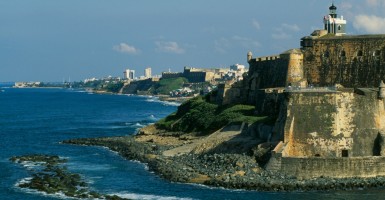Republicans, Democrats, and Wall Street investors agree that lawmakers must do more work on a plan to save Puerto Rico from looming fiscal disaster. They just disagree on the direction Congress should take to tackle the problems plaguing the U.S. territory.
A rough draft released Tuesday by House Natural Resources Chairman Rob Bishop, R-Utah, wasn’t warmly received on Capitol Hill.
Democrats complain that the bill squashes the island’s sovereignty, conservatives criticize the plan for rewarding fiscal irresponsibility, and some bondholders fear that it threatens their investments.
Combined, those concerns make it unlikely the plan will pass anytime soon.
Bishop’s plan would place a presidentially appointed oversight board at the helm of the island’s finances. The five-member panel would have wide powers to audit Puerto Rico’s ledgers, enforce a budget, and restructure the U.S. territory’s debt.
The fiscal storm isn’t anything new for the commonwealth. Puerto Rico has been underwater financially for decades. It is more than $70 billion in debt and has another $46 billion in public pension liabilities. The unemployment rate hovers around 12 percent.
Time is running out for the tropical island. Puerto Rico owes interest payments on the debt in May and June. If it can’t make payments, the territory likely will default.
Bishop stressed that his plan is meant as “a discussion draft” that isn’t final and “will change” as other House members offer more input. Lawmakers quickly registered their criticism.
Conservatives long have opposed any bailout or Chapter 9 bankruptcy for the island—an option reserved under federal law for cities, towns, and other municipalities but not states or territories.
The Republican Study Committee, made up of more than 170 members, rejected Bishop’s plan on those grounds Tuesday. The group’s chairman, Rep. Bill Flores, R-Texas, said in a statement that “changing the rules to address Puerto Rico’s fiscal irresponsibility is the wrong approach.”
Flores noted that the plan includes some “pro-growth policies” but said that the bill needs to be redrafted “to prevent bankruptcy-style involuntary restructuring.”
In the past, Democrats have advocated changing federal law and allowing Puerto Rico to seek relief from creditors by filing Chapter 9 bankruptcy. Their current position, though, criticizes Bishop’s plan for violating the protectorate’s autonomy.
“The sweeping powers of the oversight board proposed in Republicans’ current discussion draft are far from what Democrats can support,” House Minority Leader Nancy Pelosi, D-Calif., said.
Some investors appear more concerned with questions about their bottom line than Puerto Rico’s constitutional authority. Main Street Bondholders, a group of small investors from around America, slammed the bill for “establishing a clear path for Puerto Rico to walk away from 100% of its debts.”
That fear has fueled the lion’s share of the debate. Conservatives and investors worry that Puerto Rico would fail to follow through on its loan obligations and create a precedent for states to follow.
In an apparent attempt to calm those fears, House Speaker Paul Ryan, R-Wis., praised the plan as “thoughtful, comprehensive legislation that gives the U.S. territory the tools it needs to deal with its systemic fiscal and budgeting problems—without a taxpayer bailout.”
In December, Ryan put the Natural Resources Committee on notice to complete a plan by March 31. Out of session on recess, lawmakers have missed that deadline and will have to evaluate the legislation when they return to Washington on April 12.



























